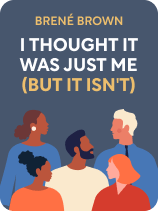

This article is an excerpt from the Shortform book guide to "I Thought It Was Just Me (but it isn't)" by Brené Brown. Shortform has the world's best summaries and analyses of books you should be reading.
Like this article? Sign up for a free trial here.
What are the three feelings shame produces? How does shame affect our everyday lives?
According to Brené Brown in her book I Thought It Was Just Me (but it isn’t), shame takes shape in three ways: fear, blame, and disconnection. Brown’s definition of shame further claims that sometimes we allow shame to consume our minds.
Keep reading to read shame-breaking advice by Brené Brown and shame’s hold on our mind.
Shame Causes Fear, Blame, and Disconnection
Brené Brown defines shame as a toxic, excruciating feeling that occurs when something or someone makes us feel like we’re defective and unworthy of love and connection. Shame most often happens when we believe we’re being labeled with an identity that we don’t want to be associated with.
For example, if you value being important, you might feel shame when another person outwits you because it makes you feel unimportant. Or, if you want to be seen as hardworking, you might experience shame when your boss suggests you spend more time on your work because you fear they think you’re a slacker. Ultimately, when our desired identities are threatened by identities we disdain, we experience shame, according to Brené Brown. And shame apparently consumes our mind, which produces three feelings that cause harm to our health, happiness, and relationships: 1) fear, 2) blame, and 3) disconnection.
(Shortform note: Most experts agree with Brown’s definition of shame, but some argue that shame isn’t always toxic—sometimes, it can have positive effects. They call this kind of shame “healthy shame” and explain that it helps us survive by teaching us how to behave acceptably and fit in with our community. Rather than shame inevitably leading to fear, blame, and disconnection, they argue that healthy shame can have positive effects like self-correcting unhealthy behaviors, making amends with others, and personal growth. They call the shame Brown refers to—the kind that’s self-punishing and lingers after the negative experience—toxic shame.)
Outcome #1: Fear
According to Brown, shame causes fear because being associated with identities we disdain makes us afraid that we’re unworthy of love and connection. In other words, we fear that others won’t want anything to do with us if they associate us with that identity. For example, someone who feels shame over being unimportant fears that this identity will make them a lesser person whom others don’t want to associate with.
Brown says our fears (the identities we disdain) usually develop due to societal expectations and the expectations of our inner circle—friends, family, peers, bosses, and so on. Societal expectations have historically caused many non-conventional identities to become disdained and a point of shame. Similarly, your inner circle might have caused you to see “creativity” as a disdained identity if you grew up in a family that looked down on artistic expression.
Outcome #2: Blame
Shame also leads to anger and blame. This is because experiencing anger and assigning blame allows us to expel the negative emotion of shame. Anger replaces the painful feeling of shame, and assigning blame allows us to direct that anger either inward or outward. Brown argues that blame in any form is unproductive because it expels negative feelings without addressing their root cause and inspiring change.
When we direct our anger inward, we blame ourselves for being defective in some way and ultimately deserving the shameful experience. For example, if someone makes you feel unattractive, you might escape the feeling of shame by directing your anger inward and blaming yourself for being foolish enough to ever believe that you were attractive. Blaming yourself overrides the feeling of shame by inducing self-hatred and self-pity instead.
When we direct our anger outward, we blame others for being unjust and feel better by believing that we didn’t deserve the shameful experience. For example, if someone makes you feel unimportant, you may escape shame by directing your anger outward and blaming the other person for being pompous.
Outcome #3: Disconnection
Finally, Brown notes that shame causes disconnection from ourselves and others when we allow it to control our thoughts, feelings, and behaviors—when it makes us feel afraid and angry and causes us to assign blame. There are three ways that the effects of shame cause disconnection:
1) Our fear, inward anger, and blame cause us to intentionally disconnect from others (emotionally or physically) to hide our shameful identities. You might avoid social events and end up disconnected from friends and peers.
2) Our fear, outward anger, and outward blame cause us to unintentionally disconnect from others. For example, someone who feels shame over being unimportant might outwardly direct anger and blame by getting defensive and asserting superiority over anyone who threatens them. This aggression might cause them to unintentionally disconnect by making others dislike and avoid them.
3) Our fear of being associated with identities we disdain makes us pretend to be someone we’re not, disconnecting us from ourselves. For example, someone who feels shame over being seen as “nerdy” might give up certain “nerdy” passions in favor of activities that seem “cool.” This can disconnect them from their true identity and cause confusion about who they really are and what’s truly important to them.

———End of Preview———
Like what you just read? Read the rest of the world's best book summary and analysis of Brené Brown's "I Thought It Was Just Me (but it isn't)" at Shortform.
Here's what you'll find in our full I Thought It Was Just Me (but it isn't) summary:
- Brené Brown's guide on what shame is, why it happens, how it impacts our lives
- How to build empathy and combat shame
- Why it's important to talk about shame with others






